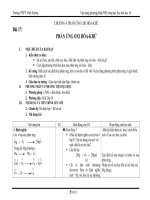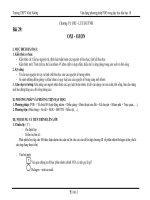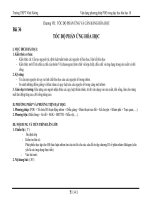Berenice_Edgar Allan Poe
Bạn đang xem bản rút gọn của tài liệu. Xem và tải ngay bản đầy đủ của tài liệu tại đây (55.62 KB, 2 trang )
About Edgar Allan Poe
Edgar Allan Poe was born in Boston in 1809. His mother and father died before he was
two years old. John Allan, a rich man in Richmond, Virginia, took the young boy into his
home. Poe was a very clever child and Mrs Allan taught him carefully, but John Allan was
never kind to Poe, and as he grew up, the boy disliked the rich man more and more. He did
not do well at school or university and in 1827 he left the Allan's' home for ever.
He worked for newspapers in Richmond, Philadelphia and New York. He wrote poems
and short stories during this time, too, but he was poor almost all his life. His life was
difficult and unhappy, in fact. He had problems with his health, with drink and with drugs.
At times he was close to madness.
In 1836 he married his cousin, Virginia, who was then about fourteen years old. After her
death, Poe started to drink a lot. He wrote: ‘I became mad. During these times, I drank. My
enemies thought my madness was because of drink. It was the other way round.’
Poe himself died in 1849. He was buried next to Virginia.
Berenice
Egaeus is my name. My family — I will not name it — is one of the oldest in the land. We
have lived here, inside the walls of this great house, for many hundreds of years. I
sometimes walk through its silent rooms. Each one is richly decorated, by the hands of
only the finest workmen. But my favourite has always been the library. It is here, among
books, that I have always spent most of my time.
My mother died in the library; I was born here. Yes, the world heard my first cries here;
and these walls, the books that stand along them are among the first things I can remember
in my life.
I was born here in this room, but my life did not begin here. I know I lived another life
before the one I am living now. I can remember another time, like a dream without shape
or body; a world of eyes, sweet sad sound and silent shadow. I woke up from that long
night, my eyes opened, and I saw the light of day again — here in this room full of
thoughts and dreams.
As I child, I spent my days reading in this library, and my young days dreaming here. The
years passed, I grew up without noticing it, and soon I found that I was no longer young. I
was already in the middle of my life, and I was still living here in the house of my fathers.
I almost never left the house, and I left the library less and less. And so, slowly, the real
world — life in the world outside these walls — began to seem like a dream to me. The
wild ideas, the dream inside my head were my real world. They were my whole life.
Berenice and I were cousins. She and I grew up together here in this house. But we grew
so differently. I was the weak one, so often sick, always lost in my dark and heavy
thoughts. She was the strong, healthy one, always so full life, always shining like a bright
new sun. She ran over the hills under the great blue sky while I studied in the library. I
lived inside walls of my mind, fighting with the most difficult and painful ideas. She
walked quickly and happily through life, never thinking of the shadows around her. I
watched our young years flying away on the silent wings of time. Berenice never thought
of tomorrow. She lived only for the day.
Berenice — I call out her name — Berenice! And a thousand sweet voices answer me
from past. I can see her clearly now, as she was in her early days of beauty and light. I see
her... and then suddenly all is darkness, mystery and fear.
Her bright young days ended when illness — a terrible illness — came down on her like
sudden storm. I watched the dark cloud pass over her. I saw it change her body and mind
completely. The cloud came and went, leaving someone I did not know. Who was this sad
person I saw now? Where was my Berenice, the Berenice I once knew?
This first illness caused several other illness to follow. One of these was a very unusual
type of epilepsy. This epilepsy always came suddenly, without warning. Suddenly, her
mind stopped working. She fell to the ground, red in the face, shaking all over, making
strange sounds, her eyes not seeing any more. The epilepsy often ended with her going
into a kind of very deep sleep. Sometimes, this sleep was so deep that it was difficult to
tell if she was dead or not. Often she woke up from the sleep as suddenly as the epilepsy
began. She would just get up again as if nothing was wrong.
It was during this time that my illness began to get worse. I felt it growing stronger day by
day.
I knew I could do noting to stop it. And soon, like Berenice, my illness changed my life
completely.
It was not my body that was sick; it was my mind. It was an illness of mind. I can only
describe it is a type of monomania. I often lost myself for hours, deep in thought about
something — something so unimportant that it seemed funny afterwards. But I am afraid it
may be impossible to describe how fully I could lose myself in the useless study of even
the simplest or most ordinary object.
I could sit for hours looking at one letter of a word on a page. I could stay, for most of a
summer's day, watching a shadow on the floor. I could sit without taking my eyes off a
wood fire in winter, until it burnt away to nothing. I could sit for a whole night dreaming
about the sweet smell of a flower. I often repeated a single word again and again for hours
until the sound of it had no more meaning for me. When I did these things, I always lost
all idea of myself, all idea of time, of movement, even of being alive.
He pointed at my clothes. There was blood all over them. I said nothing.
He took my hand. I saw cuts and dried blood on it. I cried out, jumped to the table and
tried to open the box. I tried and tried but I could not! I fell to the floor and broke.
Dentist's tools fell out of it, and with them — so small and so white! — thirty-two teeth
fell here, there, everywhere...









